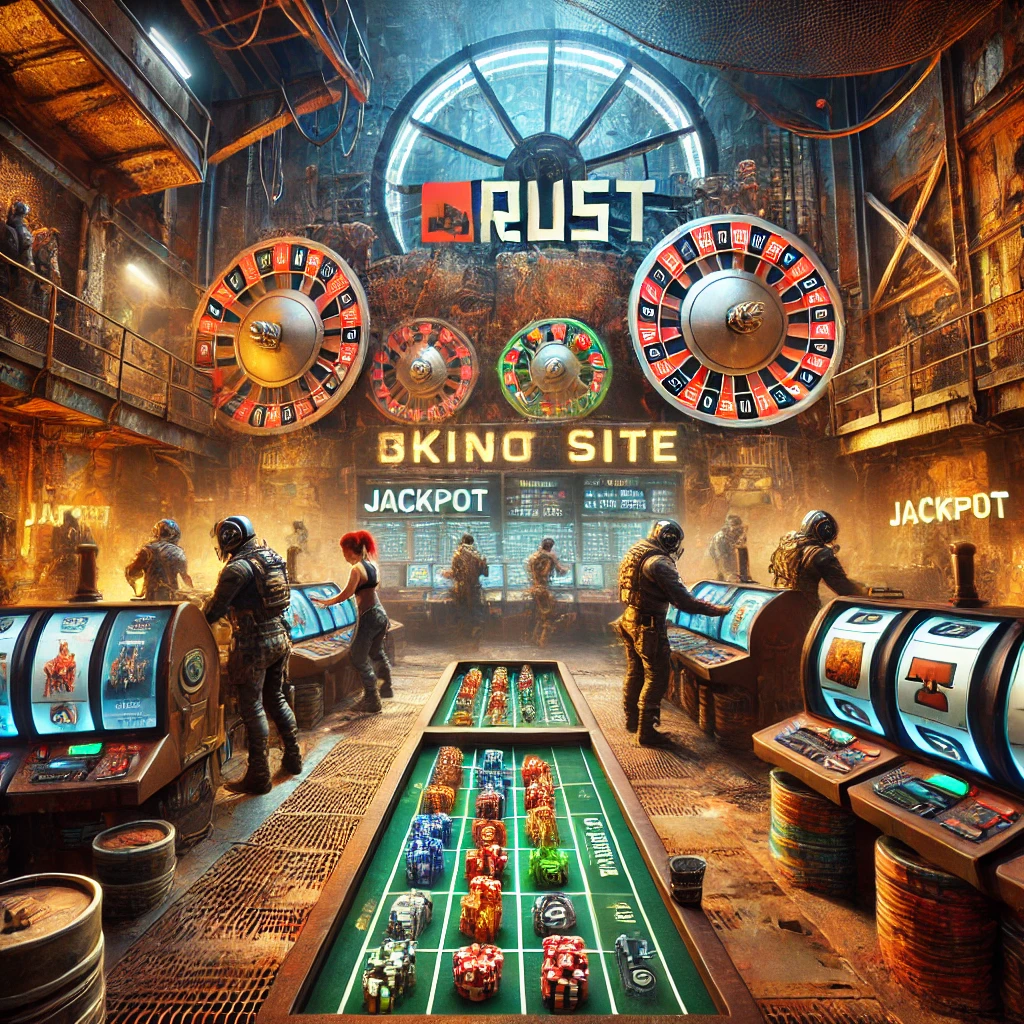
What Are Rust Gambling Sites?
In the evolving world of online gaming, a fascinating development has emerged that blends the excitement of gambling with the thrill of in-game trading. Rust gambling, which revolves around the popular multiplayer survival game Rust, allows players to wager in-game items—known as skins—in virtual casinos. These skins have real-world value, making the stakes as high as any traditional gambling site. The rise of these platforms has introduced an entirely new way for gamers to engage with their in-game items, blending entertainment, risk, and the potential for financial gain.
Rust gambling sites are online platforms where players of Rust can gamble their in-game skins. Skins are cosmetic items that don’t alter the gameplay but are highly sought after for customization and status. These items can range from basic clothing skins to rare weapons and gear, some of which are worth significant amounts of money.
The appeal of Rust gambling comes from the potential to win rare or expensive skins, which can be resold for real currency on third-party sites like Steam Market or skin-trading platforms. The essence of these gambling sites lies in transforming a virtual, in-game asset into something that holds real monetary value, often fueling high-risk, high-reward games.
How Rust Gambling Works
The key component of Rust gambling is the betting of in-game items on the outcome of various games of chance. Players transfer their skins to the gambling site and receive credits or tokens, which they can then use to participate in the following popular games:
- Coinflip: This is a simple, head-to-head betting game where two players wager skins of similar value, and a virtual coin is flipped. The player who wins takes all the skins wagered, effectively doubling their items’ value.
- Roulette: Similar to a traditional casino roulette game, players place their bets on different colors or numbers, each representing different odds. The virtual roulette wheel spins, and the winning result determines whether the player wins or loses their wager.
- Jackpot: In this game, multiple players deposit skins into a large pool. The more valuable the skins a player deposits, the higher their chances of winning. However, the game uses a random number generator (RNG) to select a winner, who walks away with the entire pool of skins.
- Crash: This game is one of the most adrenaline-filled. Players bet their skins on a multiplier, and as the multiplier rises, they can choose to “cash out” at any point. If the game crashes before they cash out, they lose their bet. The objective is to time the cash-out before the crash happens.
The Value of Rust Skins: Virtual Items with Real Money Stakes
While skins may only be virtual cosmetics within the game, they hold real-world value. In Rust, skins are often sold for anywhere from a few cents to hundreds or even thousands of dollars, depending on their rarity and demand. Players can purchase skins directly or earn them by playing the game, but many turn to trading platforms to buy, sell, and trade these items.
Once a player wins skins in a gambling match, they have the option to either keep them for personal use in the game or sell them for actual money on external marketplaces. This creates an economy where the boundary between virtual assets and real currency becomes blurred. Players can convert their winnings into actual profit, which adds a financial incentive to the gaming experience. For many, this aspect is what makes Rust gambling so appealing: the potential for monetary gain.
Legality and Ethical Concerns
As Rust gambling continues to grow in popularity, it has also sparked controversy. Since many of the players engaging in this type of gambling are young, there are concerns about the potential risks of underage gambling. Traditional casinos are heavily regulated, but Rust gambling sites often operate in a gray legal area, with varying levels of oversight depending on the country or region.
Moreover, the addictive nature of gambling, combined with the ease of access to in-game skins, has led to concerns about responsible gambling practices. Players can easily become addicted to the thrill of betting and winning, leading to potential financial losses, especially for younger audiences who might not fully understand the risks.
In response to these concerns, some platforms have introduced measures like age verification systems, deposit limits, and self-exclusion features to promote responsible gambling. However, the regulation of these sites remains inconsistent, with many operating outside the reach of traditional gambling authorities.
Third-Party Sites: A Lucrative Marketplace for Skins
One of the most significant factors in the rise of Rust gambling is the presence of third-party skin marketplaces, where players can buy, sell, and trade their winnings. Sites such as Skinport, DMarket, and the Steam Community Market provide players with a platform to turn their virtual skins into real-world money.
These platforms function similarly to stock exchanges, where the value of skins fluctuates based on supply and demand. Rare or highly coveted skins can see their value soar, making them attractive assets for players looking to profit. Once a player wins a valuable skin through gambling, they can quickly sell it on one of these sites for cash, adding a real financial dimension to the experience.
While this system can be highly lucrative for some, it also comes with risks. Like any gambling activity, there’s no guarantee of profit, and players can just as easily lose their valuable skins as they can win new ones.
Advantages and Risks of Rust Gambling
Advantages:
- Excitement and Entertainment: The thrill of gambling adds a new dimension to the Rust gaming experience. For many players, the chance to win valuable skins creates a rush of excitement, making the game more engaging.
- Monetary Gain: Players can turn their in-game items into real-world cash, making it possible to profit from playing Rust and gambling with skins.
- Community Engagement: Rust gambling has created its own subculture, with players forming communities around different gambling platforms, discussing strategies, wins, and losses.
Risks:
- Gambling Addiction: The ease of access to these sites and the fast-paced nature of the games can lead to addiction, particularly among younger players.
- Financial Loss: While the potential for profit exists, the risks are just as high. Players can lose valuable skins and money, sometimes very quickly.
- Legal Concerns: Rust gambling exists in a regulatory gray area, with many sites operating outside of traditional gambling laws. This lack of oversight can lead to unethical practices, such as rigged games or the exploitation of minors.
A Growing Phenomenon with Real-World Impact
Rust gambling represents a new frontier in the world of online gambling, blending virtual gaming with real-world financial stakes. By allowing players to bet valuable in-game skins, these platforms create a unique marketplace where virtual assets can be traded for cash. While this form of gambling offers entertainment and the potential for profit, it also poses risks, particularly regarding addiction and legal oversight.
As Rust gambling continues to grow in popularity, it’s crucial for players to engage responsibly, understanding both the excitement and the risks that come with this innovative but controversial form of gambling.

